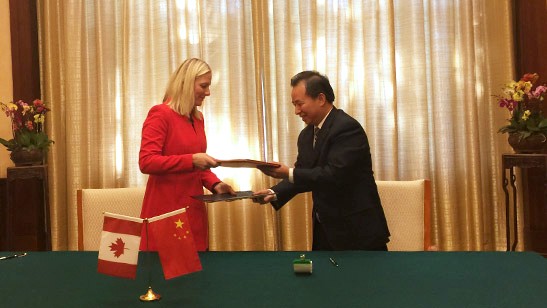Yesterday, Canada and China signed a memorandum of understanding on climate change cooperation.
The MOU was signed by the Minister of Environment and Climate Change and Minister responsible for Parks Canada, Catherine McKenna, and the Minister of Ecology and Environment of the People’s Republic of China, Li Ganjie.

“Canada and China continue to build on a long-standing history of collaboration on the environment and climate change,” said McKenna in a statement. “Pollution knows no borders; global environmental challenges require global solutions.”
The signing occurred at the conclusion of the Ministerial Dialogue on the Environment and the first Ministerial Dialogue on Climate Change. During the dialogues, Minister McKenna and Minister Li Ganjie discussed opportunities for bilateral cooperation on environmental enforcement and climate change among other topics related to the protection of the global environment.
The MOU will serve to promote Canada-China cooperation on projects to combat climate change and contribute to the global transition to a low-carbon and climate-resilient economy.
Both Canada and China have committed to fully implementing the Paris Agreement and championing the transition to a competitive, low-carbon economy and society. Canada and China will also share knowledge on domestic climate change measures such as carbon pricing and the transition away from fossil fuels and toward a clean-energy future, which will create good middle-class jobs.
The #ChinaCouncil had an incredibly productive discussion on taking climate action and how the circular economy can #BeatPlasticPollution. Good hearing from Vice Minister Zhao Yingmin, Administrator @ASteiner, and Special Representative @VidarHelgesen. #CCICED #CanadaInChina pic.twitter.com/mppgIFTFAX
— Catherine McKenna ?? (@cathmckenna) November 1, 2018
“I’m proud that, together, Canada and China are taking climate action and supporting the practical clean solutions that will strengthen our economies and protect our shared environment,” said McKenna.
Through this memorandum of understanding, both countries will encourage and promote comprehensive cooperation and partnership in public and private sectors, including government departments; subnational, regional, and local governments; relevant institutions; research centres; businesses and industries; and civil society.








